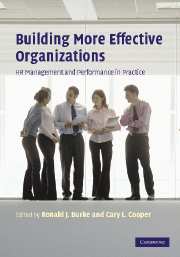Book contents
- Frontmatter
- Contents
- List of figures
- List of tables
- List of contributors
- Foreword
- Preface
- Acknowledgements
- Part I Building more effective organizations
- Part II Enhancing individual health and performance
- 2 Enthusiastic employees
- 3 Organizational citizenship behavior, transaction cost economics, and the flat world hypothesis
- 4 Best practices for work stress and well-being: Solutions for human dilemmas in organizations
- 5 Enhancing staff well-being for organisational effectiveness
- Part III Enhancing organizational health and performance
- Part IV Transforming organizations
- Index
5 - Enhancing staff well-being for organisational effectiveness
Published online by Cambridge University Press: 05 June 2012
- Frontmatter
- Contents
- List of figures
- List of tables
- List of contributors
- Foreword
- Preface
- Acknowledgements
- Part I Building more effective organizations
- Part II Enhancing individual health and performance
- 2 Enthusiastic employees
- 3 Organizational citizenship behavior, transaction cost economics, and the flat world hypothesis
- 4 Best practices for work stress and well-being: Solutions for human dilemmas in organizations
- 5 Enhancing staff well-being for organisational effectiveness
- Part III Enhancing organizational health and performance
- Part IV Transforming organizations
- Index
Summary
Early to bed, early to rise Work like hell and advertise
Ted TurnerThe European Protestant work ethic in combination with the American gift for self-promotion, captured well by Ted Turner, seems to define what the typical CEO would consider the key ingredients for high performance in their organisation. The idea that they should be concerned with the well-being and health of their staff, as a business or organisational performance issue, still seems to be a curious notion to many. This is most likely to be true for businesses with Boards that believe that anything that is outside a narrow definition of shareholder value or Return On Investment (ROI) should not be their concern. This chapter argues that staff well-being should be considered as an essential determinant and metric of organisational and business effectiveness.
The healthy, happy, productive worker is a well established new notion. However, in our work – helping organisations improve staff well-being – we keep being asked for its business case. In our experience the assumption among business managers is often that you can attend to staff happiness and well-being, as a “touchy feely” HR issue, or you can drive high performance and productivity, but it is not usually possible to reconcile these twin aims.
In fact, this distinction between issues that relate to high performing work-forces versus issues concerned with improving the well-being of workforces is purely academic – in the worst sense of the word! It does not reflect the realities of organisational life.
- Type
- Chapter
- Information
- Building More Effective OrganizationsHR Management and Performance in Practice, pp. 110 - 124Publisher: Cambridge University PressPrint publication year: 2007



